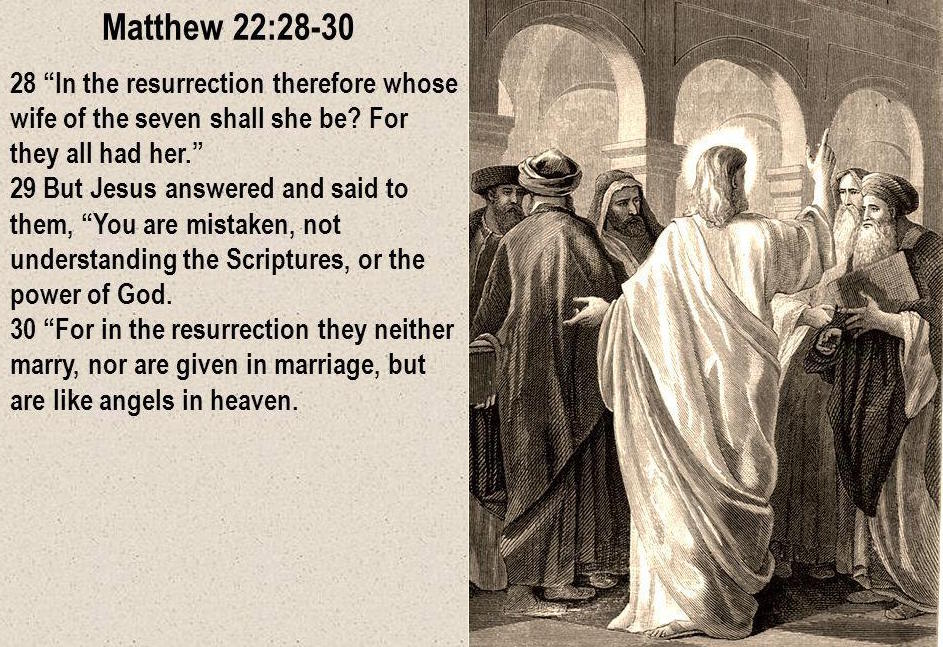

2 Maccabees 7:1-14
Psalm 17:1-15
2 Thess 2:16-3:5
Luke 20:27-38
A group of men, all men, gather in conversation outside the Temple. Jesus is among them, yet He is no one of any account to them. They are not religious men, not as we understand the phrase, but rather are members of the ruling class. Inevitably, as with any group of powerful men, there is a hint of swagger. Arch humor denotes their sophistication. No doubt they are given to off-color quips especially when they are in their cups. And they bring some of their characteristic chatter to Jesus. A woman was wife to seven brothers. They all had her ....
Do you hear the sexual humor? This is not the conversation of devout Pharisees. Far from it. This is the superior banter of Sadducees, the aristocrats of Jerusalem. "Who will be having her each night after the resurrection? Eh ....?" The irreverence of the story gives away their impious opinions concerning Heaven, which, to their minds, is a fairy tale. And the woman? Well, suffice it to say there is a certain symmetry between the seven husbands and the seven or so Sadducees, who are also having her after a fashion as their imaginations turn in a certain direction. Not only is there an air of male "knowledge" in this conversation but more than a hint of titillation.
As He so often does in the midst of human animus, Jesus strikes a sober note. To those who "know better," His reply is flinty and glib: "You are mistaken, not understanding the Scriptures or the power of God." One hears the tone of another Sadducee among these men -- Zechariah, father of St. John the Baptist. Zechariah, too, exhibits a certain superiority and "knows better" mentality .... to none other than Gabriel, the Archangel, who directly enlightens him concerning the real power in the room. This time, the one shedding light among benighted men lost in ignorance is no angel, but the Light of the World. And their reply to Him recalls Zechariah's: silence.
He invites them to see beyond their gross materialism, which is nowhere more vividly displayed than in one's sexual prerogative over another person's body. Heaven is beyond material bodies and death, He tells them. Heaven is a living, shimmering web of life connecting all people through and with and in God: they "cannot die any more, because they are equal to angels and are sons of God, .... Now, he is not God of the dead, but of the living; for all live to him" (Lk 20:36-38).
The Lord of Life, the Light of the World, roams the Eastern Mediterranean inviting one and all into this empyreal life. For the Kingdom of Heaven has drawn near! The Kingdom of God is at hand! But outside the Temple this morning, we encounter old men who are too much absorbed in the lurid details of a dead woman's sexual life and in their own failing bodies which they carry about with obvious, if subtle, groans. And we are filled with sadness for our broken world and for those who near the end of their journey so heavily laden with dying flesh that it nearly suffocates the infinite soul. And we remember the words of W. B. Yeats, who also grieved at this all-too-common scene: "An aged man is but a paltry thing .... / a soul sick with desire / And fastened to a dying animal."
Do you recognize these people in our own time and culture? The ones who are clever and arch and who dismiss the Kingdom of Heaven as so many fairy tales? The fearsome angels do not smile. And the world around these sad people darkens unto night. Let us pray for them and for the dimming light falling all around us. Amen.